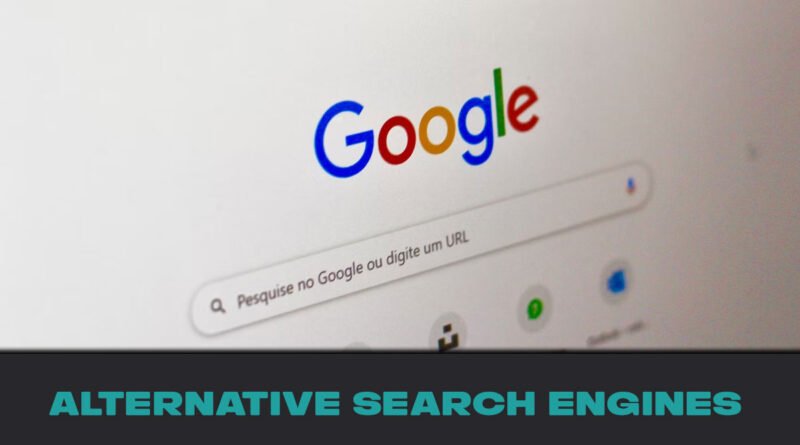5 Best Alternative Search Engines To Google
In an age where our lives are intricately interwoven with the digital realm, the significance of search engines cannot be overstated. Google, Bing, and other mainstream search giants have long dominated the online landscape, shaping the way we access information. However, this convenience comes at a price – the sacrifice of our privacy.
As concerns about data collection, targeted advertising, and online tracking rise, individuals are seeking alternatives that prioritize privacy and unbiased search results. This blog post delves into the world of alternative search engines, exploring options that offer a respite from the data-hungry behemoths.
We’ll navigate through the intricacies of DuckDuckGo, Swisscows, Brave Search, Startpage, and Disconnect Search, shedding light on their unique features and the benefits they bring to users.
Are you ready to know the details? Let’s get started.
Why Seek Alternatives to Traditional Search Engines
In the digital age, traditional search engines like Google and Bing have become synonymous with online exploration. They’ve transformed into gatekeepers of the vast expanse of information available on the internet. However, as these search giants amass data at an unprecedented scale, concerns about privacy breaches and targeted advertising have prompted users to seek alternatives.
The Downsides of Popular Search Engines:
Traditional search engines operate on business models that rely heavily on collecting user data. From your search history to your geographical location, these platforms build intricate profiles to tailor advertisements and personalize search results. While this may enhance user experience to some extent, it comes at the cost of sacrificing user privacy.
Moreover, the potential for biases in search results raises questions about the neutrality of these platforms. Algorithmic biases can inadvertently shape the information users are exposed to, reinforcing existing beliefs and limiting the diversity of perspectives.
Are There Alternative Search Engines?
In a world dominated by the likes of Google and Bing, the question arises: are there viable alternatives for users seeking a departure from the status quo? The answer is a resounding yes. An array of alternative search engines has emerged, each offering a departure from the data-hungry and potentially biased landscape of traditional search giants.
Top 5 Alternative Search Engines to Google
Here are the top five alternatives to Google, each meticulously selected for its commitment to user privacy, unbiased results, and a departure from the conventional data-centric approach:
1. DuckDuckGo

DuckDuckGo stands tall as a beacon of privacy in a sea of data collection. As the first contender in our exploration of alternative search engines, DuckDuckGo has earned its place at the forefront for a compelling reason—it doesn’t track you.
What is DuckDuckGo and Why is it #1?
At its core, DuckDuckGo is more than just a search engine; it’s a privacy-focused sanctuary for online explorers. Unlike Google and Bing, DuckDuckGo doesn’t delve into your personal information. It doesn’t collect, share, or store your search history or any identifiable data. As a user, this means your searches are entirely anonymous—a refreshing departure from the data-hoarding practices of its mainstream counterparts.
Benefits of Using DuckDuckGo:
DuckDuckGo goes beyond its privacy-centric foundation, offering a user-friendly interface akin to Google. The results are not only relevant but are delivered without the prying eyes of advertising trackers. Here are some key benefits of using DuckDuckGo:
- Automatic Ad Tracker Blocking: Experience ad-free surfing without the intrusion of advertising trackers.
- User-Friendly Browser Extension: Seamlessly integrate DuckDuckGo into your browsing experience with a free browser extension.
- Private Search History: It’s like browsing in incognito mode; DuckDuckGo doesn’t keep a record of your search history.
- Control Over Personal Data: Take charge of your personal data and enjoy a more secure online exploration.
- Accuracy and Relevance: DuckDuckGo provides accurate and comprehensive results, rivaling and often surpassing other popular search engines.
2. Swisscows

Swisscows emerges as a powerhouse among private search engines, charting a course that aligns with user confidentiality. This alternative search engine is not just a name; it’s a commitment to providing a secure and family-friendly online exploration.
Swisscows: A Swiss Army Knife of Private Search
The essence of Swisscows lies in its Swiss roots, a country known for its commitment to privacy and security. As a private search engine, Swisscows takes this commitment to the next level. It refrains from tracking your searches and goes a step further—it doesn’t index or display adult content, ensuring a safe online space for users of all ages.
Benefits of Using Swisscows:
- Family-Friendly Browsing: Swisscows is designed to be family-friendly, ensuring that adult content is neither indexed nor displayed.
- Zero Data Monitoring: Swisscows does not monitor or store any user data, providing a secure haven for private searches.
- Swiss Data Center: The data center, nestled in the Swiss Alps, is a fortress of security, ensuring user data remains in one of the safest bunkers in Europe.
- Complete Anonymity: With Swisscows, your search history, cookies, and personal information are off the record—no tracking, no storage, complete privacy.
- Access to Varied Content: Swisscows opens doors to a wide array of content, including articles, videos, and images, creating an enriching browsing experience.
Read this: 15 Best Blogging Apps For Bloggers to Elevate their Blog
3. Brave Search

Brave Search steps into the spotlight as a search engine that champions privacy with a dash of courage. Developed by Brave, the privacy-focused browser, Brave Search was introduced in 2021, making waves for its commitment to secure, ad-free, and independent searching.
What is Brave Search and Why the Brave Approach?
In a digital era dominated by surveillance and targeted advertising, Brave Search takes a bold stance. It prioritizes privacy and security by leveraging robust encryption technology and integrated ad-blocking capabilities. But what sets it apart is its fully independent nature. Brave Search is designed to answer a staggering 99% of queries without relying on third-party entities, ensuring an autonomous and privacy-focused search experience.
Benefits of Using Brave Search:
- No Tracking, No Selling: Brave Search doesn’t track or sell user data. Your online activities remain confidential and beyond the reach of data brokers.
- Advanced Algorithms for Relevance: Leveraging advanced algorithms and machine learning, Brave Search delivers more relevant and accurate results to users.
- Privacy-First Commitment: Brave Search places privacy and security at the forefront, ensuring that user activity is never tracked or recorded.
- Knowledge Panel for Quick Insights: Similar to Google, Brave Search features a knowledge panel for popular topics, facilitating quick access to information.
4. Startpage

In the quest for a private and precise search experience, Startpage emerges as a beacon, blending the power of search with unwavering dedication to user privacy. Positioned as a private search engine, Startpage is a compelling choice for those who prioritize online anonymity and safeguarding personal information.
Startpage’s Commitment to Privacy:
Startpage’s mission is clear—to offer users a search experience where privacy is non-negotiable. Unlike mainstream search engines, Startpage does not collect or track your IP address, search history, or any personal data. This commitment to a strict no-logs policy ensures that your online activities remain solely yours, free from the prying eyes of advertisers and data aggregators.
Benefits of Using Startpage:
- No IP Address or Search Activity Tracking: Enjoy private and secure searches without leaving any traces.
- Tracker and Cookie Blocking: Prevent third parties from setting price trackers and manipulate prices while shopping online.
- Customization Features: Set your preferred language, region, and more, tailoring your search experiences to your preferences.
- No Personal Data Profiles: Startpage does not create personal data profiles based on your online activities, ensuring complete privacy.
- Unique Search Customization: Create custom search shortcuts and tailor your search experience according to your needs.
5. Disconnect Search

In the ever-expanding landscape of privacy-centric search, Disconnect Search stands out as a popular browser extension that brings privacy to the forefront without asking users to compromise on familiarity. It’s a tool designed to let users search privately using their favorite search engines, including the giants like Google, Bing, and Yahoo.
A Browser Extension with a Focus on Privacy:
Disconnect Search is more than just an extension—it’s a shield against online tracking and data collection. Unlike conventional search engines, this extension doesn’t save or share any information about its users. This means that whether you’re searching on Google for the latest news or exploring Bing for specific information, Disconnect Search ensures your queries remain confidential.
Benefits of Disconnect Search:
- Protection from Malware and Phishing: Safeguard your online experience with built-in protection against malware and phishing attacks.
- Encrypted Searches: Enjoy the security of encrypted searches, keeping your queries safe from prying eyes.
- Access to Blocked Websites: Bypass restrictions and access blocked websites without compromising on privacy.
- Preventing Tracking and Selling: Disconnect Search is your shield against companies and brands tracking and selling your search data.
- No Additional Extensions Required: Seamlessly search privately using your preferred search engine, directly from your browser’s address bar, without installing additional apps or third-party extensions.
Read this: How to Create a Free Blog on Blogspot
What Defines an Unbiased Search Engine?
An unbiased search engine is one that refrains from favoring specific viewpoints, ideologies, or sources in its search results. It presents information neutrally, without influencing the user toward a particular narrative. Achieving true impartiality in the realm of search engines is a complex challenge, but several criteria can be considered in evaluating their potential for bias.
Criteria for Evaluating Search Engine Bias:
- Source Diversity: A search engine should draw results from a diverse range of sources, ensuring that users are exposed to a variety of perspectives.
- Algorithm Transparency: The transparency of the search engine’s algorithm is crucial. Users should have insight into how results are ranked and why certain pages appear higher in the list.
- Minimization of Personalization: While some personalization enhances user experience, excessive personalization may lead to filter bubbles, limiting exposure to diverse perspectives.
- Avoidance of Political Affiliation: An unbiased search engine should steer clear of favoring any political ideology, party, or agenda in its search results.
- User Feedback Integration: Platforms that actively seek and incorporate user feedback in refining search algorithms demonstrate a commitment to continuous improvement and addressing potential biases.
What Makes an Alternative Search Engine Better than Google?
The ubiquity of Google in our online lives is undeniable, but the drawbacks of relying solely on this tech giant are becoming increasingly apparent. In this section, we explore the pitfalls of depending on Google and compare the features of alternative search engines to understand what sets them apart and makes them superior choices for users seeking privacy, unbiased results, and a break from the conventional.
The Pitfalls of Relying Solely on Google:
Google, despite its prowess in delivering search results, comes with its set of concerns. These include:
- Data Collection Overdrive: Google’s business model thrives on data collection, creating detailed user profiles for targeted advertising. This level of surveillance raises privacy concerns.
- Filter Bubbles and Personalization: Google’s algorithms tend to personalize search results, creating filter bubbles that reinforce existing beliefs and limit exposure to diverse perspectives.
- Potential for Biased Results: Algorithmic biases may inadvertently influence the information users are exposed to, potentially favoring certain viewpoints over others.
Comparing Features: Alternative Search Engines vs. Google:
Now, let’s compare the features of our alternative search engines—DuckDuckGo, Swisscows, Brave Search, Startpage, and Disconnect Search—with Google:
| Criteria | Alternative Search Engines | |
|---|---|---|
| Privacy-Centric Approach | Limited privacy, extensive data collection | Prioritize user privacy, minimal data collection, anonymous searches |
| User-Friendly Interface | Familiar, user-friendly interface | Intuitive interfaces for a seamless transition from Google |
| Ad-Free Surfing | Advertising trackers present | Block advertising trackers for an ad-free searching environment |
| No Personalization Overdrive | Highly personalized results | Strike a balance between personalization and diversity to avoid filter bubbles |
| Focus on Unbiased Results | Potential for biased outcomes | Actively work towards providing a more neutral and diverse array of search outcomes |
As we assess the features of alternative search engines, it becomes clear that their commitment to privacy, transparency, and unbiased results positions them as compelling choices for users seeking a departure from the data-centric and potentially biased landscape of Google.
Also read: Top 10 Popular Personal Blogs to Follow
Conclusion
In a digital revolution, the quest for privacy, unbiased results, and a break from the norm has given rise to alternative search engines—your key to navigating the evolving online landscape.
DuckDuckGo, Swisscows, Brave Search, Startpage, and Disconnect Search offer more than just results. They deliver privacy, intuitive interfaces, ad-free searching, and a fine balance between personalization and diversity. Google, while a giant, faces scrutiny for data collection and potential biases, paving the way for these alternatives.
As users, the power to redefine your search experience is in your hands. Whether it’s DuckDuckGo’s privacy sanctuary, Swisscows’ precision, Brave Search’s bold approach, Startpage’s private haven, or Disconnect Search’s familiar grounds, each alternative represents a step towards an empowered, privacy-centric journey online.
The future of search is not just about finding information; it’s about finding it on your terms—private, unbiased, and seamlessly tailored to your needs. So, as you embark on your next search, consider these alternatives that redefine the way we navigate the internet. It’s your search, your way—embrace the future!




